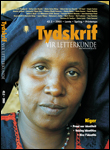The joys or misfortunes of love in the courtly epics of Djado Sékou
DOI:
https://doi.org/10.4314/tvl.v42i2.29705Keywords:
Djado Sékou, courtly epic, love, NigerAbstract
Djado Sékou, a professional storyteller, is one of the most celebrated griots in Niger. He has a predilection for everything that deals with the imaginary and dreams. His audience is fond of love stories, which he considers a superior form of literature. Love in the narratives of Djado Sékou, it is a founding and fundamental theme. The theme of love permeates Niger’s courtly epic as the narratives “Labdedjo” by Tinguizi and “Garba Mama” by Djéliba Badjo well exemplify. Djado Sékou is one of the storytellers who have sung the most of love, in particular, the love of men for one woman, Awli Djawando. Along with Lobbo Soga, Takadé Waldé, Fatumata Bidani and Sipti Diembel, Awli Djawando has entered the pantheon of Niger’s celebrated muses. However, if Djado Sékou sings of love, the joy and revival of individuals who experience “dizziness”, it is noteworthy that his songs also often originate from suffering and the misfortunes of love. This essay explores constituting themes Djado Sékou’s narrative repertoire: love stories as fairy tales, ecstasy and loss, metamorphosis of places and names and journeys.
Downloads
References
Djado, Sékou. 1974a. Awli Djawando. Niamey: The Institute for Research in Social Science.
Djado, Sékou. 1974b. Bubu Ardo Galo. Interview.
Djado, Sékou. 1974c. Gorba Dicko. Interview.
Djado, Sékou. 1974d. Hamma Bodedjo Paaté. Interview.
Djado, Sékou. 1974e. Sombo Soga. Niamey: The Institute for Research in Social Science.
Djéliba, Badjé. 1974. Garba Mama. Niamey: The Institute for Research in Social Science.
Bachelard, Gaston. 1942. L’eau et les rêves. Paris: José Corti, 19.
Bachelard, Gaston. 1989 [1949]. La Psychanalyse du feu. Paris: Gallimard.
Barthes, Roland. 1977. Fragments d’un discours amoureux. Paris: Le Seuil.
Brochier, Jean-Jacques. 1994 [1967]. Mon siècle par Aragon. La Magazine littéraire 322: 34-41.
Chevalier, J. & Gheerbrant, A. 1982. Dictionnaire des Symboles. Paris: R. Laffont.
Kristeva Julia. 1990 [1983]. Histoires d’amour. Paris: Gallimard.
Rougemont de, D. 1979. L’Amour et l’Occident. Livre I. Paris: Plon, coll. “10/18”.
Suard, François. 1993. La chanson de geste. Paris: PUF.
Sur, Jean. 1966. Aragon, Le Réalisme de l’amour. Paris: Ed. du Centurion.
Stendhal [ps. Marie-Henri Beyle]. 1989 [1822]. De l’amour, “Appendix”. Paris: Gallimard-Flammarion.
Tandina, Ousmane. 2003. L’Epopée au Niger à travers quelques récits de griots. Amiens: Jules-Vernes University.
Tinguizi. 1974. Labdedjo. Niamey: The Institute for Research in Social Science.
Downloads
Published
Issue
Section
License
Copyright (c) 2005 Tydskrif vir Letterkunde

This work is licensed under a Creative Commons Attribution-ShareAlike 4.0 International License.


 https://orcid.org/0000-0001-6465-6584
https://orcid.org/0000-0001-6465-6584


.png)